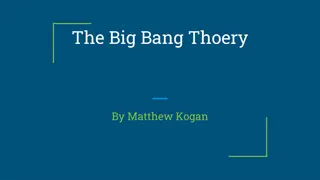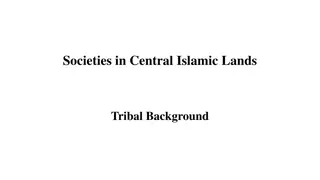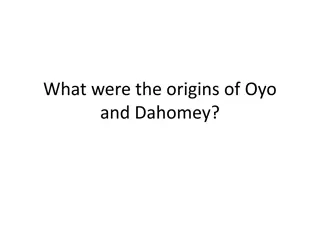
Evolution of Sociology: Key Figures and Enlightenment Influence
Discover the origins of sociology through the key figures who shaped the discipline, from Auguste Comte to W.E.B. Du Bois. Learn how the Enlightenment period influenced the development of modern society and the emergence of sociology as an academic discipline rooted in reason and science.
Download Presentation

Please find below an Image/Link to download the presentation.
The content on the website is provided AS IS for your information and personal use only. It may not be sold, licensed, or shared on other websites without obtaining consent from the author. If you encounter any issues during the download, it is possible that the publisher has removed the file from their server.
You are allowed to download the files provided on this website for personal or commercial use, subject to the condition that they are used lawfully. All files are the property of their respective owners.
The content on the website is provided AS IS for your information and personal use only. It may not be sold, licensed, or shared on other websites without obtaining consent from the author.
E N D
Presentation Transcript
Origins of Sociology A brief introduction to some of the key figures in the development of sociology as an academic discipline Start Start
Origins of Sociology Instructions About Exit The Enlightenment
Origins of Sociology Instructions About Exit Auguste Comte (1798-1857)
Origins of Sociology Instructions About Exit Harriet Martineau (1802 1876)
Origins of Sociology Instructions About Exit Karl Marx (1818-1883)
Origins of Sociology Instructions About Exit Emile Durkheim (1857 - 1917)
Origins of Sociology Instructions About Exit Jane Addams (1860-1935)
Origins of Sociology Instructions About Exit George Herbert Mead (1863 1931)
Origins of Sociology Instructions About Exit Max Weber (1864-1920)
Origins of Sociology Instructions About Exit W.E.B. Du Bois (1868-1963)
Origins of Sociology The Enlightenment The 17th century is generally seen to mark the birth of modern society, initially in Britain and then across the world, that gradually replaced the premodern, feudal, societies of antiquity. This period was notable in Europe for great cultural upheavals, as scientists and intellectuals, such as Issac Newton (1643 1727), began to question the prevailing view of the world based on religious faith, magical superstition, custom and tradition. The Enlightenment marked the first concerted attempt to challenge these beliefs through reason and science: the idea social development - from the darkness of a superstitious past to the illumination of a reasoned future - could be advanced through the application of scientific knowledge. And it was into this general scientific upheaval that Sociology developed as an academic discipline devoted to understanding both social order and, most importantly, social change. 1 of 2
Origins of Sociology The Enlightenment Alongside the cultural, ideological and scientific challenges to the old established religious and academic order, the French Revolution (1789) provided a strong political challenge. The absolute Monarchy that ruled one of the most powerful nations in the world was swept away on a tide of Republican fervour and the old aristocratic rulers were either killed or exiled. A third element added to the mix was the economic changes introduced by the Industrial Revolution that began around the middle of the 17th century in Britain and parts of Europe. It was against this background of economic, political and cultural change that the development of a modern science of society - one that explained how and why social change was occurring in the ways that it did came into being through a range of powerful thinkers 2 of 2
Origins of Sociology Auguste Comte Against the background of change introduced by the Enlightenment, the French philosopher and mathematician Auguste Comte (1798-1857) developed two key ideas still current in contemporary sociology: The first focused on one of the enduring questions in sociology - how is social order created and maintained? The second focused on what he saw as a scientific method (positivism) through which we could discover the laws governing social development . In this respect, Comte (1830) argued all human societies passed through three stages: 1 of 2
Origins of Sociology Auguste Comte The theological, where order was based on religious beliefs and controls. The metaphysical: a "transition phase" characterised by upheaval and disorder, where the old religious order was challenged by the emergence of science. The positive: the stage where science and reason reveal the nature of the social world and replaces religion as the basis for social order. Comte argued the means through which the scientific basis of social order could be revealed was through a new science of social development he called La Sociologie (Sociology); this was based on the "positivist" methodological principles that had been successfully applied by natural sciences, such as physics and chemistry, to understand development in the natural world. 2 of 2
Origins of Sociology Harriet Martineau The role of women in the development of modern sociology has traditionally been overlooked in favour of a founding fathers narrative, mainly focused on the Big 3 of Durkheim, Marx and Weber. More recently, however, the part played by female writers has started to emerge, with the work of Martineau being of particular importance. While her translation of Comte from the original French helped popularise his ideas about social development in the English-speaking world, Martineau was more than a translator. In How to Observe: Morals and Manners (1838), for example, she set-out to systemise the idea of dispassionately observing the social world in much the same way a natural scientist of the time would observe the physical world. As she argued, few people would pretend to understand the vagaries of the natural world without first immersing themselves in the methods of observing such a world. Yet Every man seems to imagine that he can understand men at a glance . 1 of 2
Origins of Sociology Harriet Martineau On the contrary, the powers of observation must be trained, and habits of method in arranging the materials presented to the eye must be acquired before the student possesses the requisites for understanding what he contemplates . In this respect one of Martineau s great contributions to sociology was to argue that the understanding of social behaviour needed to be based on systematic data observation, collection and analysis. In addition to her attempts to systematise how people thought about and understood social behaviour, Martineau also wrote extensively about a variety of social issues based around concepts of class, religion and women s rights - a proto-feminist analysis that predated 1st wave feminism by almost 100 years. Through her travels in America she was also one of the first writers to use the comparative method to analyse and understand similarities and differences in social institutions across different societies. 2 of 2
Origins of Sociology Karl Marx While Comte took a consensus approach that stressed social order was created and maintained through co-operation, Karl Marx (1818-1883), approached the question of order differently. Order was created and maintained through conflict. He argued social development had passed through four epochs or time- periods: primitive communism, ancient society; pre-industrial (feudal) society and Industrial (capitalist) society, each characterised by different types of economic relationship. In feudal society the relationship was between lord and peasant while under capitalism it was between owners and non-owners. These relationships were always based on relations of domination and subordination; one group always exploited other groups to enhance their own economic interests. 1 of 3
Origins of Sociology Karl Marx In capitalist societies, for example, the dominant group was the bourgeoisie, those who owned the means of economic production (such as land, factories and machines). The subordinate group (or class) was the proletariat - the vast majority of the population who owned nothing but their ability to work (their labour power) in exchange for money - which they used to buy the goods they created from the bourgeois class. Marx introduced a range of ideas that remain significant in contemporary sociology, not the least being class conflict between the bourgeois and proletarian (working) classes. He also argued order is maintained through a mixture of force - controlling people with violence, imprisonment or even death - and ideas (socialisation); people could, for example, be convinced about the need to maintain orderly behaviour through the power of religious teachings. In contemporary societies this persuasive power is exercised through institutions like education and the mass media. 2 of 3
Origins of Sociology Karl Marx Another significant idea that flows from class conflict is class inequality - the idea that in capitalist societies one small group own most of the wealth while the vast majority own little or nothing (an idea that has re- emerged recently in the various Occupy Movements around the world, where the wealth and power of "the top 1%" is contrasted with that of the "bottom 99%"). This, in turn, gives us the idea of class stratification - different social classes ranked hierarchically (one on top of the other) in terms of their wealth, power and status. Power is, in this respect, a very significant concept and, for Marx, power came from economic ownership. Those who controlled economic resources were also powerful across all areas of society: from politics through education to the media. 3 of 3
Origins of Sociology Emile Durkheim Emile Durkheim (1857 - 1917) who followed in the general consensus tradition established by Comte - although unlike the latter Durkheim's work and ideas remain an influential force in the theory and practice of sociology to this day, for two reasons: Firstly, Durkheim saw societies as social systems that could only be fully understood in terms of the relationship between their various institutions - patterns of shared, stable, behaviour that persist over time, such as families, the workplace, religion, education and politics: how and why was the family connected to the workplace, for example? He aimed to resolve a fundamental problem for all forms of sociological analysis, namely, what is the "social glue" that holds a mass of individuals together as a society? His answer was to see social systems as "moral entities : something to which people feel they belong and to which they owe allegiance. Societies had, in other words, to develop systems of social solidarity to make people feel they belonged. 1 of 3
Origins of Sociology Emile Durkheim In pre-modern or traditional societies, solidarity is mechanical: people are bound together by who they are - part of a family or some other kinship group such as a clan. In modern societies organic solidarity predominates; people are bound together by what they do, such as paid work. This type of solidarity, while allowing the formation of much larger groups than its mechanical counterpart, is more-complicated to create and so requires integrating mechanisms - ways of making unrelated people feel they have things in common. These mechanisms are many and varied, but examples include things like a shared belief in democracy or pledging allegiance to a common flag that is itself symbolic of a particular society. 2 of 3
Origins of Sociology Emile Durkheim Secondly, in The Rules of Sociological Method (1895) Durkheim made a significant contribution to the development of sociology as a science by showing sociologists could both produce objective knowledge about social behaviour - facts that prove or disprove certain arguments - and explain behaviour as the result of something more than just the simple psychological choices made by individuals. In Suicide (1897) Durkheim set-out the basic principles through which human behaviour could be scientifically studied and applied these rules to the study of suicide to demonstrate how it had social, as opposed to purely biological or psychological, causes. 3 of 3
Origins of Sociology Jane Addams Frequently described as a key founder of American Sociology, Jane Addams combined social activism (a co-founder of Hull House in Chicago, a space initially created to help impoverished immigrants) with sociological research. In this respect Addams combination of social and sociological activism informed much of her research into areas like child labour and immigrant health care. Her focus on applied sociology - how sociological research and insights can be used to inform social policy - was influential in the development of the Chicago School of Human Ecology that blossomed, through influential writers such as Burgess, Park, Shaw and McKay, from the 1920 s onward. 1 of 2
Origins of Sociology Jane Addams In common with the Chicago School one of the central concerns in Addams sociology was the impact of social and material environments on individual behaviour - a pioneering concern with human ecology that is still reflected in some forms of 21st century sociology - from green criminology to the work of people like Wilson and Kelling( Broken Windows). Addams also notably worked with the American Symbolic Interactionist George Herbert Mead both academically and on social reforms that included improving women s rights and ending child labour practices She was awarded the Nobel Peace Prize in 1931. 1 of 2
Origins of Sociology George Herbert Mead Mead, alongside his contemporary Max Weber, pioneered a very different kind of sociology to the macro versions developed by writers such as Comte, Marx and Durkheim. Mead developed a Symbolic Interactionist view of the world (a variant of Action theory or Interactionism) that rejected the idea society has an objective existence separate from the people who, through their everyday relationships, create and populate it. Society is an "elaborate fiction" we create to help us make sense of our social relationships. Rather than attempting, like Comte, Marx or Durkheim in their different ways, to explain human behaviour as the result of external, objective, forces Mead rejected the notion human behaviour was a response to some form of external stimulation: as Mead argued, people react differently to the same social stimulation depending on the circumstances in which the act takes place - an idea he developed in some of his most challenging work: a theory of The Self. 1 of 3
Origins of Sociology George Herbert Mead For Mead (1934), our behaviour is conditioned by two aspects of our self- development and awareness (the ability to "see ourselves" as others see us). 1. The "I" (the unsocialised Self ) relates to automatic (reflex) reactions. For most animals this is the dominant aspect of the Self in that their behaviour is an unconscious reaction to external stimuli. 2. The "Me" (or socialised Self ) involves an awareness of how other people expect us to behave at any given situation. Before we act, we take account of a variety of situational variables (such as where we are and who we re with) that govern how we behave. If you accidentally put your hand on something hot, the "I" aspect of the Self is expressed by how you react to the pain (a reflex reaction). The "Me", however, specifically conditions how you choose to react to the pain and this is conditioned by a range of different factors. 2 of 3
Origins of Sociology George Herbert Mead If an adult male burns himself he may feel it inappropriate to cry especially if he is with a group of friends who all find his discomfort funny. A young child, on the other hand, may react with tears because they focus on their own feelings (rather than taking into account the feelings of others). The Me , therefore, represents what Mead calls the socialised Self ; we think about how our actions will impact on others and, in turn, on ourselves. The combination of unconscious (unthinking or reflex) and conscious behaviour that constitutes The Self relates to the idea of self-concept (who and what we believe ourselves to be) and this, in turn, relates to identity. To realise our Self (to define and understand who we are) we draw on a range of social resources (credentials) rooted in social identities (such as gender or ethnicity). 3 of 3
Origins of Sociology Max Weber The German sociologist Max Weber (1864-1920) was, like many of his contemporaries, particularly focused on understanding social change and,in particular, how societies modernised. How, for example, pre-industrial societies based around agricultural production and labour, powerful feudal lords and a relatively powerless peasantry, developed into industrial societies based around manufacturing and various forms of political democracy. Weber (1905) developed different ideas to both Marx and Durkheim about how social change came about. He argued social development, once started, followed a process of modernisation, features of which included industrialisation, urbanisation and rationalisation (behaviour and social organisation based on bureaucratic scientific principles) - but there had to be something that kick-started this process because change was not inevitable. 1 of 2
Origins of Sociology Max Weber This led Weber (1922) to develop a theory of Social Action - one that sits alongside Consensus and Conflict theories as three of the major sociological perspectives that are still currently used to group broad categories of sociological theories and concepts. Weber argued social change was the result of individuals and groups acting purposefully to bring about such change. In some instances change is created by charismatic leaders - people who influence others through the power of their personality; individuals such as Jesus Christ (Christianity) or Mohammad (Islam) founded great world religions while, in the 20th century we could point to charismatic political leaders like Hitler or Churchill. More-usually, change is initiated by small religious or political groups; Weber, for example, highlighted the role of the Calvinist (Protestant) religion in providing the ideas and practices that allowed industrial forms of economic production to develop and flourish in the late-17th century and, by so doing, lay the foundations for the Industrial Revolution and modern society 2 of 2
Origins of Sociology W.E.B. Du Bois William Du Bois is one of the key figures in the development of both American Sociology and our understanding of race and racism. His first major work, published in 1896, is arguably one of the first attempts to systematically quantify how racist attitudes and policies in the United States impacted the lives of its black victims through the extensive use of large-scale first-person interviews. It was both the first sociological case study of a specific social group (the African American community in Philadelphia) and also one of the first to employ sophisticated statistical data collection and modelling to illustrate the pervasive, structural, nature of racial inequality. In a later work (1903) Du Bois introduced two significant sociological concepts that are still used to inform contemporary sociologies of ethnicity: 1 of 2
Origins of Sociology W.E.B. Du Bois The Veil refers to how the experience of race and racism leads minority ethnic groups (initially African Americans) to see the world very differently from their majority ethnic counterparts. Du Bois drew on his own experience of racism to formulate this idea when, as a young child, he realised how he was treated differently simply on the basis of his black skin that meant he was shut off from the white world by a vast veil . Double-consciousness refers to the idea that experience of The Veil leads Black people to develop two ways of seeing and understanding their lives. The first involves their immediate social relationships with friends, family and community that leads to the development of particular individual identities related to the position and standing within such local groups. The second, however, involves something darker and more sinister in the sense self-awareness is continually shaped by exposure to a White world that sees them as not just different (separate but equal) but actually inferior. 2 of 2
Instructions How To Use This Presentation From the main information card carousel, use the left and right arrow keys to browse the list of cards (nine in total). The currently active card will appear in colour while inactive information cards appear in greyscale. Click the currently active information card. This will take you to a page or pages of information about that card. Use the left and / or right arrows to navigate these pages as necessary. To return to the main information card carousel click the small carousel button bottom right. To access the Presentation Menu click the chevron at the top left of the page. Click the chevron again to hide the Menu. Click the right arrow below to return to the Presentation.
About About This Presentation Origins of Sociology: Designed and created by Chris Livesey ShortCutstv
Exit You can find further Sociology Presentations at Shortcutstv.com






















